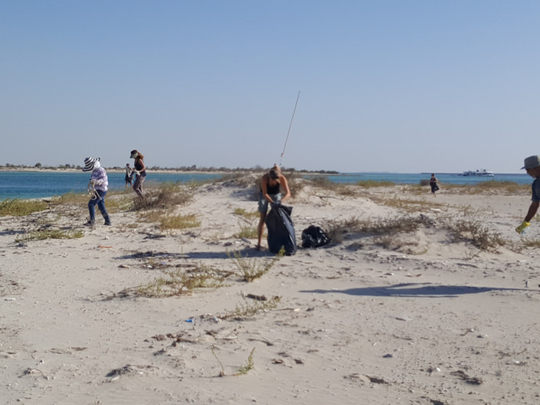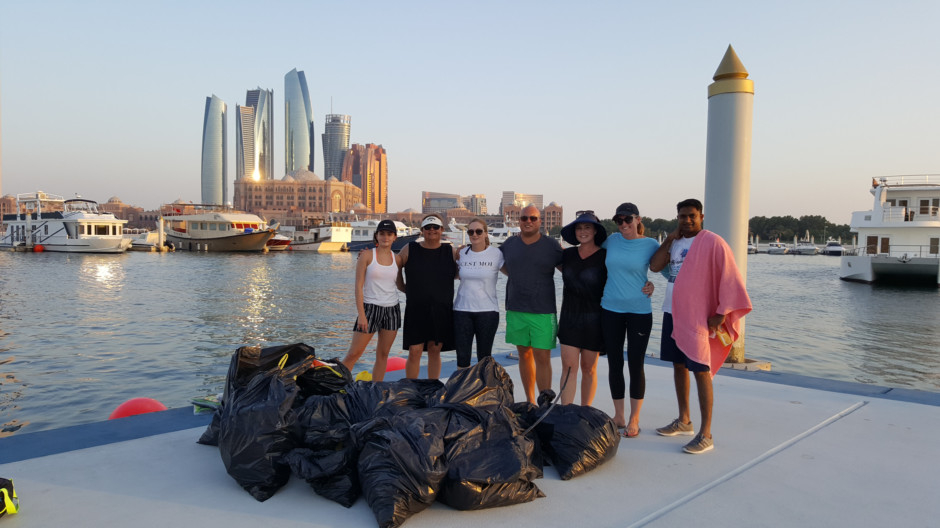
Abu Dhabi: Out on a boat trip, Abu Dhabi resident Simony Sinclair was horrified to see the piles of rubbish floating in the blue seawater. But instead of simply lamenting the water pollution like many of us do, the 49-year-old British homemaker decided to take things into her own hands.
Sinclair got in touch with friends and acquaintances, and soon secured the use of a boat for some clean-up activities of their own.
“We’ve been out on five trips, each for about three to four hours, and we’ve managed to retrieve 1,147 kilograms of rubbish from the seawater and beaches,” Sinclair told Gulf News.
“It is our own little way of making a difference and giving something back to our planet,” she added.
Sinclair, whose father worked as a skipper in South Africa, said she grew up respecting the earth and its finite resources.
“It pains me to see innocent creatures suffering because they’ve become tangled in plastic bags, or ingested plastic debris. I love the ocean and all living things, and just had to do something right away,” said Sinclair, who has lived in the capital with her husband for about four years.
She then went on to check with her friends and social media contacts about the availability of a boat.
“As it turned out, a boat was only available on some weekday afternoons, so I grabbed at the chance. On our first trip out, we had six people, which was all the boat could fit, and we collected a little more than 90 kilograms of waste,” Sinclair said.
And though it was hard, tiring work in hot weather, Sinclair said she was determined to continue.
“We scoop out the rubbish using fish nets, and have picked up thousands of bottle caps, plastic canisters, containers, plastic bottles and metres of nylon rope. Much of this appears to have lain in the seas or the beaches for a prolonged period of time, and disintegrates as soon as we touch it, which then makes the clean-up even harder. But we are firm about getting all of it, especially as these small pieces can do so much damage to wildlife,” she explained.
The friends would collect the waste in plastic bags, then load them on to the boat, and then use their own cars to transport it to The Club, a private leisure facility, for recycling. This was especially important to Sinclair, as she was firm that the waste should not end up in landfills.
During the last two sessions, however, Shaheen Miah, the Bangladeshi owner of Al Shaheen moving company, brought along his truck, and selflessly helped transport some of the bags halfway through the session.
“This meant that we were able to fill up even more bags, and at the end of the fourth trip, we had 58 bags with 337 kilograms of waste. Then, last week, we topped this by collecting 436 kilograms,” Sinclair said.
She adds that the task is not easy, but that the group keeps its spirits up and takes along snacks and refreshing drinks to keep themselves hydrated.
Markus Fahlbusch, 36, a firefighter from Germany, said he has seen first-hand the suffering of sea creatures affected by the pollution during his many dives off the Abu Dhabi coast.
“I hope our activities will also open the minds of others to do whatever they can to help. Can you believe we collected nearly 20 garbage bags full of plastic bottles during one session alone?” he said.
Sharon McNeill, a 46-year-old homemaker from Scotland, had joined a couple of the clean-up sessions.
“It’s very upsetting to see beautiful marine creatures like turtles and dolphins suffering because human beings are so irresponsible. And this is why I like to participate in these sessions. I’ve even taken along my 21-year-old daughter once,” she said.













